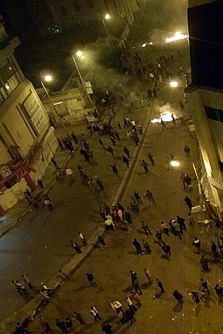
By Mohamed Selim
Better late than never. As every decision in Egypt is always overdue, regardless of the consequences and constitutional prerogatives, the parliamentary elections will eventually take place. The constitution stipulates, according to Article 230:
“Election of the President of the Republic or the House of Representatives shall take place as regulated by Law, provided that the first of either elections shall take place within a period not less than 30 days and not more than 90 days after the date on which this Constitution comes into effect. In all cases, the following electoral procedures shall commence within a period not exceeding six months as of the date on which the Constitution comes into effect.“
Given that the constitution was ratified on 18 January, the parliamentary election is more than one month later than its constitutionally due. And regardless of the date(s) that the president of the republic will call for, the campaign has already started.
In retrospect, the campaign battle won’t differ from the presidential elections held last May. Egypt’s media, which endorsed their candidate for the revered presidential post, Army General Abdel Fattah Al-Sisi, have also chosen the criteria for the candidates of the People’s Assembly (Egypt’s Lower House of Parliament).
Tacitly, the majority of the official, quasi-official, private and Gulf-funded (Saudi and Emirati, given that the Qatari-funded are blacklisted) media have blessed the candidates who are: pro-military, secular (with the exception of the Al-Nour Party, known for its Salafi leanings, Saudi funding and conservative followers), and anti-Muslim Brotherhood (MB).
Through their coverage, analyses and hours-long programmes, the defanged-media will vigorously attempt to convince the disenchanted public that without a strong MB-free-parliament, the president won’t be able to fulfil his promises, and thus the republic’s welfare. Long polling station queues are always desired to stamp the regime with the desired legitimacy, thus hefty slogans, like ‘The People’s Choice’ and/or ‘Egypt Decides’ will be superimposed on all screens supplemented by the Egyptian flag throughout the voting period(s).
This comes at a time where, for the first time since 1984 (no Orwellian pun intended, as it’s a historic fact), the People’s Assembly won’t witness MB candidates, whether through unequivocally bearing their affiliation and famous slogan (Islam is the Solution) or, even, as independent contenders.
The media acquiescence to Egypt’s miligarchy is commensurate to the endless problems that are plaguing Egypt. The media’s role, as a fourth estate, is of asking tough questions, using its mandate to investigate, scrutinise and maintain neutrality at all times and to serve the interests of the public at large, not one single institution or establishment. The media in Egypt has discombobulated the presidential campaign and tilted its support for one candidate in a farcical and shambolic manner. Al-Sisi was never asked about the massacres of Rabaa Al-Adaweya and Al-Nahda squares of 14 August 2013. Directives, like the ones issued by the Presidential Election Commission (PEC) on 30 March, have never been heeded. Issues like campaign funding remain sidelined.
Article-5 of the PEC’s directives makes it clear in its first section, “The maximum amount that every candidate can spend on his campaign is EGP 20m ($3m). And in case of a runoff, EGP 5m is the maximum amount to be spent“. Yet, given the inundation of Al-Sisi’s campaign commercials, posters, billboards (and other outdoor advisements featuring endorsements by local businessmen, tribal elders and religious leaders), in addition to endless media appearances by him and his campaign apparatchiks on both the official, private and Arab channels, not one single indicator by the PEC has been announced of his potential violation in respect of Article 5.
Al-Sisi’s campaign’s Advertising Director, the media magnate Tarek Nour, owner of the TV network Al-Kahera Wal Nas, has revealed to Al-Masry Al-Youm, a daily Egyptian newspaper, on 12 May (just over two weeks before the election), that Al-Sisi’s campaign had at that point spent EGP 12m, of which EGP 6m was for conference preparations and another EGP 6m for other means of advertising. The questionable conformity of Al-Sisi’s campaign with the funding ceiling and the lack of oversight of both campaigns raises eyebrows and leaves many unanswered questions regarding the integrity and disinterestedness of the PEC and that of the democratic credentials of Egypt that its current regime is incessantly boasting of.
If the Parliamentary Election Commission didn’t heed to its mandates regarding issues like funding, neutrality of the security forces and the media among others, the country is about to witness another farcical chapter towards its transition to a full-fledged miligarchy, reminiscent of Thailand’s current malaise (with its military-appointed parliament selected on 25 August General Prayuth Chan-ocha to be the country’s Prime Minister).
Other pertinent subjects, like the crackdown on journalists, human rights activists, and MB sympathisers are still, three months after the election of the highest post in Egypt’s government, treated lightly by much of the media – accepting the ubiquitous notion that, at a time of terrorism, basic freedoms ought to be sidelined.
Furthermore, through the election of a weak parliament, the legislative branch of government will be born dead, thus losing the ability of oversight and accountability. While prominent media personalities are still fulsomely star-studded by the military establishment’s selfless intervention in the country’s politics, any critique directed at the current roadmap is considered perfidious and a plot instigated by the country’s enemies to bring down the state.
Should Egypt disembark of the martial political culture that has beleaguered the nation for 62-years, another approach towards politicians ought to be utilised: one that considers all candidates, whether for president, parliament or municipal posts, as servants of the public not untouchables who are doing the people a favour by ruling them. The media have a role in initiating and abiding by such democratic principles. Until then, democracy in Egypt will always be a nonsensical charade.
Mohamed Selim is a media scholar with a research emphasis on Political Communication in the Arab World, University of Osnabrück, Germany. Twitter @moselim




